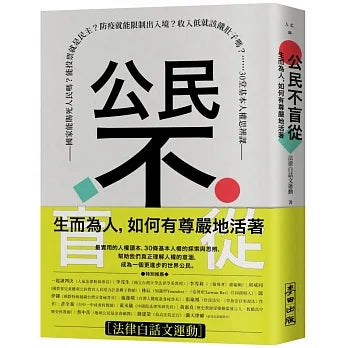人權不是特權。人權到底是什麼?
一本適合所有人閱讀的人生教科書
納稅者權利法跟我有什麼關係?家長有權利對「同志教育」說不嗎?歌手不能唱自己的歌?紅燈何時亮,幾時可尋芳?……
最實用的人權讀本,30條基幫助我為一個更進步的世界公民。
一本適合所有人閱讀的人生教科書
納稅者權利法跟我有什麼關係?家長有權利對「同志教育」說不嗎?歌手不能唱自己的歌?紅燈何時亮,幾時可尋芳?……
最實用的人權讀本,30條基幫助我為一個更進步的世界公民。
●特別推薦一起讀判決(人氣法律粉絲專頁)/李茂生(國立台灣大學法律學系教授/李雪莉(《報導者》總編輯)/周威同( YouTuber、《臺灣吧Taiwan Bar》共同創辦人)/書長)翔(台灣人權促進會祕書長)/張瑜鳯(資深法官,《章魚法官來說法》作者/許全義(台中一中社會科教師)/黃丞儀(中研院法律所研究員)/黃史教師深根聯盟發言人、板橋高中歷史科教師)/蔡中岳 (地球公民基金會顧問)/錢建榮(最高法院法官)/蘭天律師(依姓氏筆劃排序)
人權並非國家所賦予的權利,而是先於國家、任何社會與法律制度出現前就存在了,而人權的內涵就在於體現對人之尊嚴的尊重,每個人都是有自主性的主體,而不會淪為被他人或國家所支配的客體。
1948 Universal Declaration of Humanity Rights,這一天也被訂為人權日。
二戰結束後,世界各地的人們看盡殘暴的國家機器如何輾壓自己或其他國家的人民,因此聯合國成立時,各國即把人權保障視為這個國際組織最重要的目的之一,並迅速通過了《世界人權宣言》。
/
— —雖然締約或修改條文都太困難,但我們能透過重新詮釋、擴充文義,讓人權法持續保持其活力和韌性。反之,若將失其最初捍衛個人尊嚴及促進社會正義的精神。這也是一開始想編輯這本書主要目標,希望提供讀者有關人權與基本自由的基本認識,學習相關語彙後,用以觀察自己與其他人的生活處境,進而勾勒出心目中理想社會的藍圖。——法律白話文運動
本書邀請一群年輕有想法、寫過多部暢銷法普書的「法律白話文運動」執筆,以明確好讀的文字,把嚴肅的法律知識,轉化為一般大眾容易理解的常識。內容以聯合國特別為青少年編寫的《世界人權宣言》簡易版三十條為基礎,從每一則法條的核心精神作闡釋,並援引國內外的案例,輔助說明該法條我們應該具備的正確觀念,探索人權樣貌,傳達人權基本知識,權的重要。
也許我們對這些人權條文並不陌生,但我們對它的內甚或明知故犯;在世界仍然到處充斥忽視人權、侵犯人權的情況下,我們如何理解並維護自身的人權,已是一個當代的重要課題。
作為自許尊重人權的台灣,這本書深入淺出的書寫,提醒我們正視人權的重要,我們才能更往前成為一個進步的世界公民。
●內容大要
美國知名歌手小甜甜布蘭妮為何害怕父親的監管?性工作者真的不配擁反送中運動為何衍生出抗議者被受虐酷刑?維吾爾族被中國奴中國真的吃西方人權這套?跨國棒球員曹錦輝的假球案如何引用「無罪推定原則」? COVID-19 Yee)在網路上批評李光耀為獨裁者,他是否「傷害他人宗教或種族情感」?土耳其海面上漂浮了一名紅衣小男孩的屍體,他足以召喚難民的無辜嗎?原住民自傳統部落領域取回木材,是否竊盜觸法?禁止穆斯林婦女穿罩袍是錯誤的法令?……
全書談及的領域眾多,包括身心障礙者、遊民、勞工、維吾爾族、人權工作者、難民、愛滋感染者……;議題多元,包括反送中、八仙樂園火燒案、死刑存廢爭議、打假球、隱私權、出版管制、兒少言論權利、集會遊行示威、罷工、迫遷、恐同、受教育權、著作權、國際人權……
從個人到社會,從台灣到世界,各式各樣的基本人權議題,在在凸顯人權脆弱的面向。當大眾被侵權時是否真能知法而保護自己的權利?「法律白話文運動」有條不紊地整理出人類與生俱有的權利,不僅讓普羅大眾閱讀本書而獲得啟蒙,更可以觀照自身本該擁有的權利,避免因為對權利的懵懂與知識的薄弱,進而喪失權利而讓生命深陷恐懼的泥淖之中。
這本書每一章談論的都是人權的缺角,破碎的缺角拼圖起來,才能更接近人權的真相。
每章末附有「思辨與討論」,延伸引導讀者對該章作進一步思考;書末並有相關人權工作者的筆記(例如台灣廢除死刑推動聯盟、台灣障礙女性平權連線、身心障礙聯盟、台灣同志諮詢熱線協會等,作為對照參考,豐富對人權的探討。
